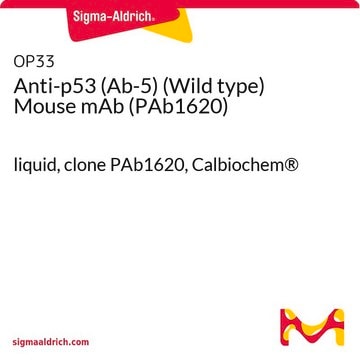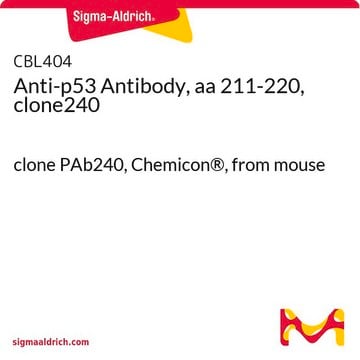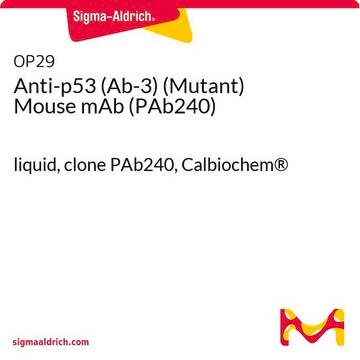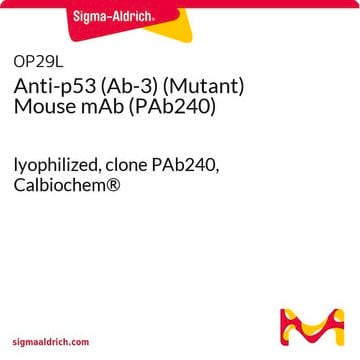MABE339
Anti-p53 (wild type) Antibody, clone PAb1620
clone Pab1620, from mouse
Sinónimos:
Cellular tumor antigen p53, Tumor suppressor p53
About This Item
Productos recomendados
biological source
mouse
Quality Level
antibody form
purified immunoglobulin
antibody product type
primary antibodies
clone
Pab1620, monoclonal
species reactivity
human, mouse
technique(s)
immunohistochemistry: suitable
western blot: suitable
isotype
IgG2aκ
NCBI accession no.
UniProt accession no.
shipped in
wet ice
target post-translational modification
unmodified
Gene Information
human ... TP53(7157)
General description
Immunogen
Application
Immunoprecipitation Analysis: A representative lot from an independent laboratory detected p53 in IP (Lu, X., et al. (1992). Cell. 70(1):153-161.).
Immunohistochemistry Analysis: A representative lot from an independent laboratory detected p53 in dorsal skin samples from animal trunks (Kramata, P., et al. (2005). Cancer Res. 65(9):3577-3585.) and in certain human cancer tissues (Cordon-Cardo, C., et al, (1991). 51(23 Pt 1):6372-6380.).
Epigenetics & Nuclear Function
Cell Cycle, DNA Replication & Repair
Quality
Western Blot Analysis: 1 µg/mL of this antibody detected p53 in mouse brain tissue lysate.
Target description
Physical form
Storage and Stability
Analysis Note
Mouse brain tissue lysate
Other Notes
Disclaimer
¿No encuentra el producto adecuado?
Pruebe nuestro Herramienta de selección de productos.
Storage Class
12 - Non Combustible Liquids
wgk_germany
WGK 1
flash_point_f
Not applicable
flash_point_c
Not applicable
Certificados de análisis (COA)
Busque Certificados de análisis (COA) introduciendo el número de lote del producto. Los números de lote se encuentran en la etiqueta del producto después de las palabras «Lot» o «Batch»
¿Ya tiene este producto?
Encuentre la documentación para los productos que ha comprado recientemente en la Biblioteca de documentos.
Nuestro equipo de científicos tiene experiencia en todas las áreas de investigación: Ciencias de la vida, Ciencia de los materiales, Síntesis química, Cromatografía, Analítica y muchas otras.
Póngase en contacto con el Servicio técnico








